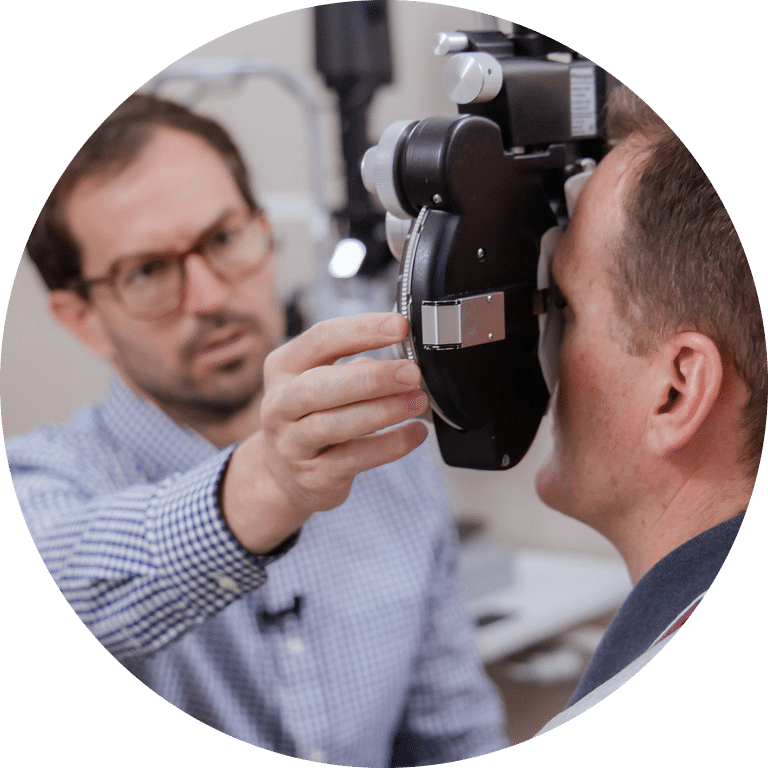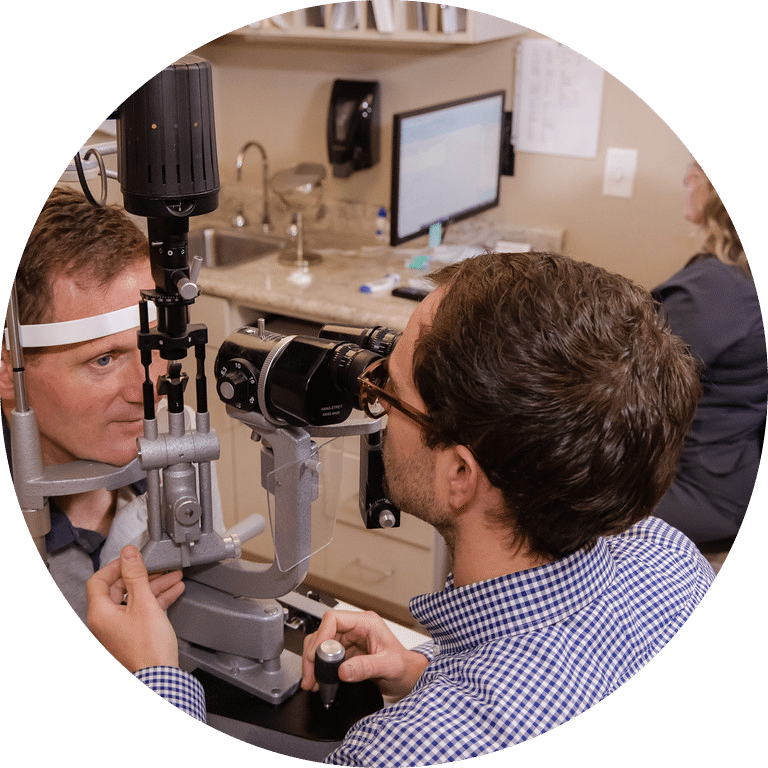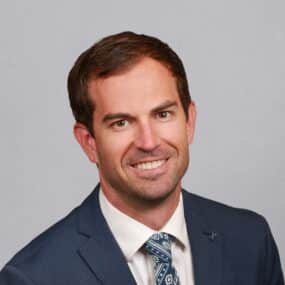
Ophthalmology
The Ophthalmology team at Tanner Clinic specializes in diagnosing, treating, and managing eye diseases and disorders, offering a comprehensive range of eye care services. They offer a wide range of services related to eye care, including Comprehensive Eye Examinations. Ophthalmologists perform thorough eye exams to assess your vision, eye health, and overall eye function. These exams can detect refractive errors (nearsightedness, farsightedness, astigmatism), as well as eye diseases and conditions.
CONDITIONS:
Furthermore, they have the expertise to determine the appropriate eyeglass or contact lens prescription to correct vision problems. In addition, they aid in the treatment of refractive errors through procedures such as LASIK (Laser-Assisted In Situ Keratomileusis). This procedure can reduce or eliminate the need for glasses or contact lenses. Their capabilities extend to the diagnosis and treatment of diverse eye conditions and diseases. Thes may include cataracts, glaucoma, macular degeneration, diabetic retinopathy, and more.
Ophthalmologists are highly trained in performing surgical procedures on the eyes, including cataract surgery, glaucoma surgery, corneal transplant, retinal detachment repair, and eyelid surgery.
In cases of eye infections, injuries, and trauma, our Ophthalmology experts are adept at diagnosing and treating these conditions, which can involve tasks such as removing foreign bodies and suturing wounds. They also provide continuous care and manage chronic eye conditions, ensuring they effectively control and monitor these conditions. They also offer ongoing care and management for chronic eye conditions, ensuring these conditions are effectively controlled and monitored. Additionally, they assist individuals with low vision by providing devices, training, and support to help them make the most of their remaining vision and maintain their independence.
It’s important to note that ophthalmologists are medical doctors, equipped to provide both medical and surgical treatments for a wide range of eye conditions. If you have concerns about your eye health or vision, we recommend scheduling an appointment with an ophthalmologist for a comprehensive evaluation and appropriate care. You can make an appointment at 801.773.4840. At the Eye Center at Tanner Clinic, you’ll find comprehensive eye care conveniently located near Davis Hospital and Medical Center. Our office is open Monday through Friday from 8 a.m. to 5 p.m. They also provide continuous care and manage chronic eye conditions, ensuring they effectively control and monitor these conditions.

WHAT TRAINING DO OPHTHALMOLOGISTS RECEIVE?
An Ophthalmologist attends and graduates medical school. They take all of the medical board exams and become a licensed MD. After medical school, they will attend an ophthalmology residency for four years. The first year is typically oriented towards general medicine where they continue to learn how to take care of medical conditions. Because of this, they become very comfortable treating systemic infections, cardiovascular diseases, respiratory diseases, gastrointestinal diseases, etc. The next three years are dedicated to diagnosing and treating eye diseases. It is important to have the medical background as many systemic diseases manifest themselves in the eye. With this medical knowledge, a doctor specializing in ophthalmology is able to make a systemic diagnosis from an eye exam and either start treatment for the underlying disease or refer the patient to the appropriate doctor who will treat their systemic disease.

WHAT’S THE DIFFERENCE BETWEEN AN OPTOMETRIST AND AN OPHTHALMOLOGIST?
Need to see an eye doctor but not sure where to start? Both optometrists and ophthalmologists are experts in eye care, yet both specialize in specific areas. Here are a few of the key differences between these two eye care specialties:
Optometrists: Optometrists focus on primary care for the eyes and are not required to be medical doctors; instead, they attend four years of professional eye care training after college and receive a doctor of optometry degree. Vision care is often the main focus for optometrists. They fit patients for contact lens and glasses based on their vision evaluation and provide routine check-ups on the general health of the patient’s eyes.
Ophthalmologists: While optometrists provide primary care, ophthalmologists act as eye specialists, treating complex medical and/or surgical conditions of the eyes. They must complete medical school and a special residency program focused on medical eye care.
They often treat common ocular conditions like glaucoma, provide surgical care for conditions like cataracts, or even carry out cosmetic surgery around the eye area. At an ophthalmologist appointment, your doctor can also provide basic eye check-ups and vision care like an optometrist, meaning they can evaluate and fit you for contact lenses or glasses. For patients with pre-existing conditions that may affect their eyes (such as diabetes), an ophthalmologist can offer valuable care because of their advanced medical training.
For some patients, visiting both an optometrist and an ophthalmologist at different times may be the best solution for comprehensive eye health. Because of their different specialties, optometrists and ophthalmologists can work together to diagnose and treat a variety of eye conditions.
WHEN SHOULD I SEE AN OPHTHALMOLOGIST?
If you have great natural vision, you may think you don’t need to see an eye doctor. However, the American Academy of Ophthalmology still recommends eye care appointments at different ages and stages in life. These preventive visits are a smart way to check in on the overall health of your eyes.
Here are some recommendations for when to schedule an ophthalmologist appointment.
Children between the ages of 3 and 5 (or before they enter kindergarten) — The first eye appointment for a child allows an ophthalmologist to check for vision problems or eye alignment issues which can be treated through early intervention.
Adults aged 40 — This stage in life is when vision can begin deteriorating. A routine check-up at age 40 can help you, ophthalmologist, spot any vision changes or early signs of degenerative eye diseases.
Adults aged 60 and older — Appointments every two years help keep eyes healthy as they age.


It’s recommended that patients with any of the following pre-existing conditions see their Utah ophthalmologist more frequently:
- If they require glasses or contact lenses
- If there is a family history of eye disease or complications
- If they have a chronic condition like diabetes (or take special medications) which may affect their vision or negatively impact their eye health
In addition, you should see a Tanner Clinic ophthalmologist as soon as possible if you experience any of the following:
- Loss of Vision – full or partial
- Change in Vision – seeing spots, flashes of light, watery vision, double vision, blurry faces, and any other distortions in vision
- Change in Field of Vision – black spots, shadows, blurriness or darkness in peripheral or central vision
- Physical Changes to the Eye – such as going cross eyed, eyes turning in, out, up or down in an unnatural way
- Changes in Color Vision
- Infection in or Around the Eye

WHAT TREATMENTS DO OPHTHALMOLOGISTS PERFORM?
Tanner Clinic ophthalmologists have mastered all surgeries that are performed on or around the eye and eyelids. Some of these surgeries include cataract surgery, LASIK, PRK, pterygium, glaucoma, retinal tears, blepharoplasty, ptosis repair, ectropion repair, etc. They are also able to perform annual eye check-ups and measure patients for glasses and contact lenses.
Our Providers
Schedule an
Appointment
Tanner Clinic makes it easy to schedule an appointment
You can live chat with an appointment representative, call us over-the-phone for appointment booking, or click below to discover which option is the most convenient for you!






